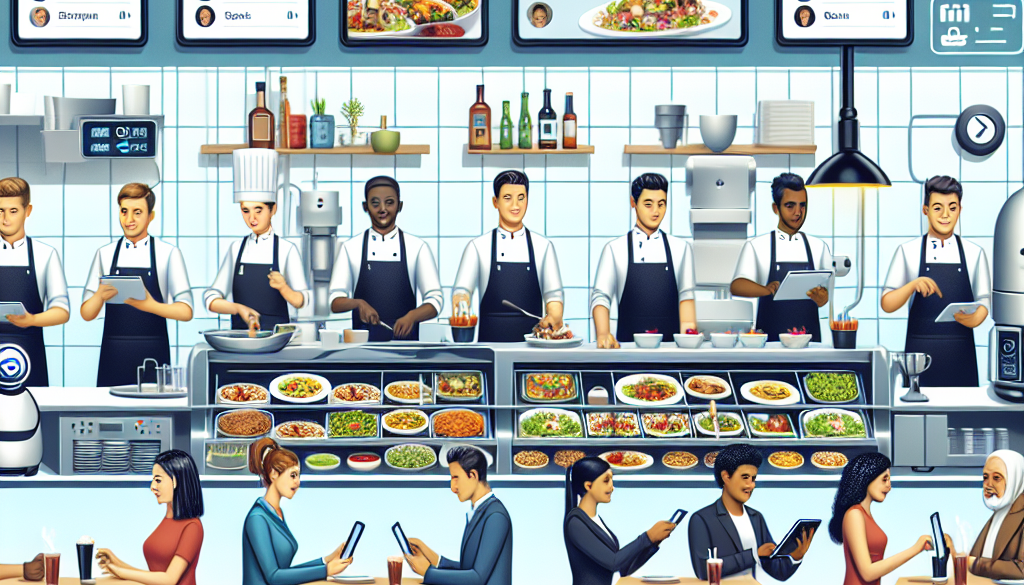Role of Technology to Implement Efficiency in a Restaurant
-
Table of Contents
- Enhancing Restaurant Efficiency Through Cutting-Edge Technology
- Point-of-Sale (POS) Systems: The Heart of Restaurant Operations
- Reservation and Table Management Systems
- Inventory Management Software
- Mobile Ordering and Delivery Apps
- Energy Management Systems
- Employee Scheduling Software
- Conclusion: The Technological Recipe for Success
- Boost Your Menu with ETprotein’s High-Quality Protein Products
Enhancing Restaurant Efficiency Through Cutting-Edge Technology

The restaurant industry is a dynamic and competitive landscape where efficiency can make or break a business. With the rise of technology, restaurateurs have found innovative ways to streamline operations, reduce costs, and improve customer experiences. This article explores the pivotal role of technology in enhancing efficiency within the restaurant sector.
Point-of-Sale (POS) Systems: The Heart of Restaurant Operations
Modern POS systems are far more than cash registers; they are comprehensive management tools that handle everything from sales tracking to inventory management. Here’s how they contribute to efficiency:
- Order Accuracy: Digital order taking minimizes human error, ensuring that customers receive exactly what they ordered.
- Inventory Management: Real-time tracking of stock levels helps prevent over-ordering and waste.
- Analytics and Reporting: Detailed reports provide insights into sales patterns, helping to optimize menu offerings and staffing.
According to a report by Toast, restaurants that adopted new technology saw a 23% increase in profitability on average.
Reservation and Table Management Systems
Online reservation systems like OpenTable and Resy have revolutionized the way restaurants manage their bookings. These platforms offer:
- Improved Table Turnover: By accurately predicting dining times, restaurants can seat more customers over the course of a service.
- Customer Data Collection: Collecting customer preferences allows for personalized service, leading to repeat business.
- Reduced No-Shows: Automated reminders and confirmations decrease the likelihood of empty tables.
Statistics show that implementing a table management system can increase reservations by up to 25%.
Inventory Management Software
Efficient inventory management is crucial for controlling costs and reducing waste. Technology in this area allows for:
- Automated Ordering: Systems can automatically reorder stock based on predefined thresholds, ensuring that ingredients are always available.
- Waste Tracking: Identifying patterns in waste can lead to more informed purchasing and menu planning.
- Supplier Integration: Direct integration with suppliers streamlines the ordering process and can lead to bulk purchase discounts.
A study by the National Restaurant Association found that 75% of restaurant operators consider inventory management software to be a key factor in their success.
Mobile Ordering and Delivery Apps
The rise of food delivery apps like UberEats and DoorDash has opened up new revenue streams for restaurants. These platforms offer:
- Expanded Reach: Restaurants can serve customers beyond their immediate geographic location.
- Convenience: Customers appreciate the ease of ordering from their smartphones.
- Data Insights: Delivery apps provide valuable data on customer preferences and ordering patterns.
According to a report by Statista, the online food delivery segment is projected to reach $192.16 billion in revenue by 2025.
Energy Management Systems
Restaurants are high-energy environments, and managing consumption is essential for both cost savings and environmental responsibility. Smart energy management systems can:
- Monitor Usage: Real-time tracking of energy consumption helps identify areas for improvement.
- Automate Controls: Systems can automatically adjust lighting and HVAC based on occupancy and time of day.
- Reduce Costs: Efficient energy use can lead to significant savings on utility bills.
Energy Star estimates that restaurants can cut energy costs by up to 30% by implementing energy-efficient practices and technologies.
Employee Scheduling Software
Labor management is one of the most challenging aspects of running a restaurant. Scheduling software helps by:
- Optimizing Staff Levels: Aligning staff schedules with forecasted business volumes prevents overstaffing or understaffing.
- Employee Self-Service: Allowing staff to swap shifts and request time off reduces administrative burden.
- Compliance: Automated tracking of labor laws and regulations ensures that scheduling remains compliant.
A survey by Software Advice found that 62% of restaurants reported increased efficiency after implementing employee scheduling software.
Conclusion: The Technological Recipe for Success
In conclusion, technology plays a critical role in the efficiency of restaurant operations. From POS systems to energy management, each technological solution offers unique benefits that can lead to increased profitability, reduced waste, and enhanced customer satisfaction. By embracing these tools, restaurants can not only survive but thrive in the competitive food service industry.
Boost Your Menu with ETprotein’s High-Quality Protein Products
As restaurants strive for efficiency, they also aim to offer nutritious and appealing menu options. ETprotein’s range of organic bulk vegan proteins and L-(+)-Ergothioneine (EGT) can enhance your menu offerings. Their non-GMO, allergen-free proteins are perfect for creating healthy and delicious dishes that cater to a variety of dietary needs. Incorporate ETprotein’s products into your menu to provide your customers with high-quality, protein-rich options.
About ETprotein:
ETprotein, a reputable protein and L-(+)-Ergothioneine (EGT) Chinese factory manufacturer and supplier, is renowned for producing, stocking, exporting, and delivering the highest quality organic bulk vegan proteins and L-(+)-Ergothioneine. They include Organic rice protein, clear rice protein, pea protein, clear pea protein, watermelon seed protein, pumpkin seed protein, sunflower seed protein, mung bean protein, peanut protein, and L-(+)-Ergothioneine EGT Pharmaceutical grade, L-(+)-Ergothioneine EGT food grade, L-(+)-Ergothioneine EGT cosmetic grade, L-(+)-Ergothioneine EGT reference grade and L-(+)-Ergothioneine EGT standard. Their offerings, characterized by a neutral taste, non-GMO, allergen-free attributes, with L-(+)-Ergothioneine purity over 98%, 99%, cater to a diverse range of industries. They serve nutraceutical, pharmaceutical, cosmeceutical, veterinary, as well as food and beverage finished product distributors, traders, and manufacturers across Europe, USA, Canada, Australia, Thailand, Japan, Korea, Brazil, and Chile, among others.
ETprotein specialization includes exporting and delivering tailor-made protein powder and finished nutritional supplements. Their extensive product range covers sectors like Food and Beverage, Sports Nutrition, Weight Management, Dietary Supplements, Health and Wellness Products, and Infant Formula, ensuring comprehensive solutions to meet all your protein needs.
As a trusted company by leading global food and beverage brands and Fortune 500 companies, ETprotein reinforces China’s reputation in the global arena. For more information or to sample their products, please contact them and email sales(at)ETprotein.com today.














